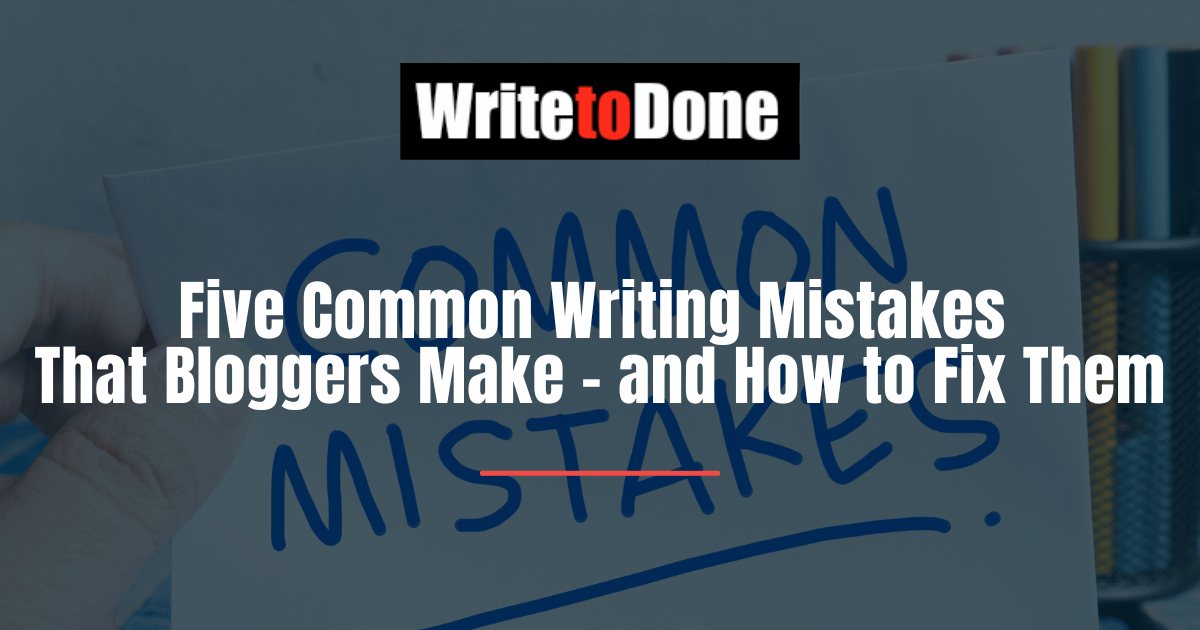I spend a lot of time working with bloggers. Most of them are pretty good writers – but they end up making some all-too-common mistakes. This means losing readers’ interest and attention – and losing potential customers.
Are you making any of these five mistakes?
#1: Missing Out Calls to Action
A “call to action” is where you encourage the reader to do something, normally at the end of a post. It might look like this:
Thoughts? Questions? Please share in the comments.
(If you’re on the homepage, click on the headline and scroll down to find the comments)
– From The New Style of Writing for the Net (Are You Up with the Play?)
In this simple call to action, Mary not only encourages the reader to leave a comment, she also pre-empts a possible question they might have on how to do that.
Your call to action should create a win/win scenario for you and the reader. For instance:
- “Leave a comment below” – increases your comment count and the chance of this reader coming back, and makes it more likely that the reader will remember/use the material you’ve provided
- “Subscribe to my newsletter” – adds the reader to your list, and means the reader will get valuable tips/advice/ideas/offers/etc from you
It’s often a good idea to give specific instructions, like “Subscribe to my newsletter: enter your email address in the box below and hit ‘Go’” – something that seems obvious to you won’t necessarily be obvious to your reader.
#2: Inconsistent Writing Style
If you’re still in the process of establishing your writing voice, you may find that your writing slips and slides between different styles. This can be jarring for the reader: one minute, you’re chatty and bubbly; the next, you’re formal and stand-offish.
Here’s an example:
One must endeavor to write in a style that resonates with one’s reader. Usually, you’ll want to be friendly and direct: your readers will thank you!
Okay, that’s a bit exaggerated – but you can see the sudden switch in tone between the first and second sentence. Words like “endeavor” are pretty formal (“try” would be a good alternative) and the use of “one” is formal and a bit archaic (“you” works well instead).
When you edit your writing, watch out for any inconsistencies: words or phrases that are too formal, and words and phrases that are too informal. Be particularly careful about the use of exclamation points or smiley faces – these might be fine in an email, but a bit out of place on your business blog.
#3: Stream-of-Consciousness Writing
If you sit down to write a blog post without a plan, it’s natural to simply write what comes into your head. This is sometimes called “free writing” or “stream-of-consciousness writing” – it’s a great way to get past writers’ block or to build a regular writing habit, but it’s not a good way to produce a coherent, structured post.
One symptom of this is explaining the reasoning behind your writing:
So, I’m writing this today because I totally forgot last week – and I know you want to hear about how my travels are going! I thought I’d start off with a little story about something that happened yesterday.
This isn’t terrible writing, but it’s also not all that engaging; it’s unnecessary chit-chat, and detracts from the main point of your post.
Another symptom is a post that rambles around and feels disjointed. When you edit, read through your posts as a whole, and check that each paragraph leads into the next. Creating a plan before you write – even just a list of key points to cover – can help you organize your thoughts and improve your post structures.
#4: Using Jargon
Whatever you blog about, there’s a chance that your industry has some jargon. You might not even recognize this as jargon because it seems so familiar to you – as a blogger, for instance, you’re probably used to words like widgets and themes and tag clouds.
Your reader might not know much about your field. If you’re a designer, for instance, and your blog is aimed at potential customers, CMYK might mean nothing to them. You’ll need to spell out the acronym (“CMYK stands for cyan, magenta, yellow, key/black”) but you may also need to write a beginner-friendly post to link to with more information.
Often, jargon can simply be avoided. Do you really need to write “the helicopter view” or “the 50,000 feet perspective” when you could just say “the long-term view”?
#5: Being Too Wordy
Most people over-write. They say the same thing twice, in slightly different ways, or add in unnecessary words and phrases. Usually, the more concisely you can express something, the stronger your writing will be.
You can normally cut out phrases like:
- In my opinion…
- I think…
- I believe…
Readers know that your post is an expression of your opinions, thoughts, and beliefs. Unless you’re drawing a distinction between common opinion in your niche and your differing views, you don’t need “disclaimers” like these.
Many other phrases can be replaced by a single word:
- It is almost always the case that = Usually
- You need to take into consideration = Consider
- On the other hand = Although
It’s hard to avoid wordiness when you’re drafting, so don’t agonize over every sentence at that stage. Once you’ve written your post, though, look through for any phrases that you could cut or shorten, and for any paragraphs where you’ve ended up saying the same thing several times. (Keep the strongest expression of your point, and cut the rest.)
What writing mistakes do you see cropping up again and again in the blogging world? Let us know your thoughts in the comments…
From WTD contributor Ali Luke of Aliventures. Ali is a writer and writing/blogging coach. Her ebook The Blogger’s Guide to Effective Writing teaches you how to construct great blog posts, write for the web, edit your work, and develop your blogging voice. Click here to find out more.

















